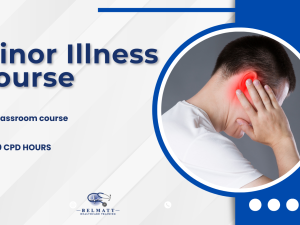Chaperoning

CPD Hours : 1
Session Type: E-Learning
Who Should Attend
This course is for all healthcare professionals primarily, for example, General Practitioners (GPs), health care assistants (HCAs), nurses, allied health professionals and other members of the broader health care team who are involved in chaperoning patients as part of their role.
The content covers what is understood by the term chaperone, why a chaperone needs to be present, the role and responsibility of the chaperone and the rights and concerns of patients.
Session Aims
- To identify when and for what a chaperone may be required,
- To understand the role requirements of a chaperone, and
- To have an understanding of confidentiality issues and the procedures involved in raising concerns.
Session Objectives
- Understand the legal, ethical and professional considerations as a chaperone.
- Understand the role of a chaperone, what is meant by the term and when they are required.
- Display appropriate behaviour during the consultation,
- Be aware of the chaperone checklist and record-keeping,
- Know how to raise concerns,
- Use interpersonal and communication skills to clarify tasks and identify and rectify issues in a range of contexts,
- Understand the competing perspectives that inform decisions and articulate reasons for own decisions,
- Develop a broader understanding of the knowledge base to identify principles underlying theoretical frameworks and begin to identify their strengths and weaknesses,
- Provide informed solutions to standard problems in familiar contexts,
- Operate under supervision in a range of varied but predictable settings, and
- Reflect on the performance tasks which may be complex and non-routine.
Chaperoning
Chaperoning
Feedback Chaperoning
Feedback Chaperoning
Related Courses
Jeshni Amblum-Almér
This minor illness course aims to develop the skills of experiences nurse practitioners, pharmacists, advanced paramedics and allied healthcare pr...
Intermediate
1 Lectures
30hrs
£495
Jeshni Amblum-Almér
This minor illness course is for nurse practitioners, allied healthcare practitioners and independent non medical prescribers working towards adv...
Beginner
30hrs
£450
Jeshni Amblum-Almér
This intensive one-day training course is designed to equip healthcare professionals such as nurses, pharmacists, paramedics, doctors, and allied h...
Beginner
6
£125
Get course
Enrolled:
11 students
Duration:
60min
Lectures:
6
Video:
1hrs
Level:
Beginner





